It’s strange that, as culture, we’re so whatever about short stories. I’m not talking about writers, of course—I’m talking about the more normal general public. My dad, a huge reader, frequently brings up how much he hates short stories (to which I always respond, “Dad, I studied short stories for four entire years”). People don’t seem to buy short story collections. So few contemporary writers are known for their stories, and even when they are, people mostly ask when they’re going to write a novel until they finally do.
But why? Short stories have so much going for them. For starters, they’re…short. They require so little commitment from you. You can, and usually should, read them in a sitting. You can reread them any old time you want without blocking out a huge chunk of time. They pack maximum impact into the smallest package. I get that many of us want to sink into a long, meaty book, but I’m not sure what else is at play here. Perhaps the idea that short stories are pointless, or unproductive, because they’re not novels?
I’m grasping at straws here, because in case you couldn’t tell, I’m a Short Story Head. There’s at least a decent chance that, if you’re a No One Asked subscriber, you are too (writing at such length about my own interests tends to attract people who also share my other interests, I’ve found…I’m not saying you necessarily love short stories if you also love Cher, but you could!). I’ve loved short stories for as long as I can remember, but I especially fell in love with them while getting my creative writing degree. Although we had classes where we discussed novels, we mostly spent our time on short stories, which makes sense. They’re easier to discuss, and write, in a classroom environment. It was the early 2000s, and maybe this is just my own bias (like how they say your favorite SNL cast is always the one from your childhood), but it truly felt like a golden age for short fiction. Lorrie Moore was at the top of her game and I thought I would be her. I spent years writing extremely poor Lorrie Moore knock-offs. George Saunders was relatively new and exciting, not yet a novelist. And then there was the GOAT, my number one back then and still today: Charles Baxter. Charles Baxter also wrote some novels, including The Feast of Love, but I was obsessed with his short stories. I read them over and over, and still remember specific imagery and phrases even today. I read interviews with him whenever I could, hoping that someday I could be like him (I’m not sure what I was going for here…was I hoping to be a significantly older man? I was a 20-year-old girl). I bought the Alice Munro collection that my writing professor demanded I get, then read and surely didn’t understand the stories because, again, I was 20.
I also, as I’ve mentioned before, went through a major and transformative Miranda July phase. Even before she released No One Belongs Here More Than You, I would spend my weekends at King Library, using the computers to look up which journals she’d published short stories in, and then I’d find those on the shelves and read them over and over before trying my hand at sounding like her (didn’t work). I read The Best American Short Stories, of course, because they were the best. Post-college, when I was deep in my quarter-life crisis (I mean, I was depressed, if I’m being honest), I checked out copies of Glimmer Train and Zoetrope and The Kenyon Review at the downtown branch of the Mansfield Richland County Public Library, reading the stories and then scouring the author bios, trying to find some secret that would help me figure out how to make my life like theirs.
I was a woman obsessed, and I was also a woman alone. Outside of college, do you know who wants to talk about short stories? No one. Just try starting a conversation about Charles Baxter in your everyday life! Just try it! You’ll be met with blank looks.
So what was it that I loved so much about short fiction? It’s not that I don’t love novels—I mean, I’ve published seven. But short stories are condensed. They cram the most emotional impact into the smallest space. Getting a tiny glimpse of a person’s life feels like eavesdropping in the most delightful way, and the element of surprise seems so much more prevalent in short stories. In Lorrie Moore stories, I noticed back in college, she so often wrote about a person who made one wrong decision, either on purpose or accidentally, and then the story flowed from there. That’s what a lot of short stories do, and maybe that’s even what a lot of novels do, and maybe I’m stating something extremely obvious about plot. But it’s just more noticeable in a short story with your limited page count.
In the forward to the fantastic short story collection Jenny and the Jaws of Life by Jincy Willett, David Sedaris describes the appeal of short stories much better than I ever could:
Like all the best storywriters, Jincy Willett excels in the moment, that split second when everything changes, and there’s a discomfort to this. We like to think we’ll recognize such moments in our own lives, but when the time comes we almost always get it wrong. Our eyes peeled for the Big Event, we point out the usual suspects—the death of a parent, the car spinning out of control—not realizing that the damage was done weeks or maybe years earlier, over dinner or while washing our hair, the moment cunning in its very resemblance to everyday life.
And isn’t that it? Highlighting a tiny moment, amplifying something you might not even notice, and making it big enough to change a life…that’s a short story.
Way back in February, I decided to read a short story every day and I more or less did, but then I forgot all about the project until the end of May. I know many people like to read a tome in the summer, working their way through all 1000+ pages of Infinite Jest. But I decided to flip that goal. What if I read something really small? What if I tried to read a short story every day? What if I gave myself a moment in every day to be shocked, moved, surprised, horrified, angry, etc.?
And so Short Story Summer was born. You can join in, too! The rules are simple.
So there’s really only one rule: read a short story every day.
But the second rule is: if you miss a day or two or five it’s no big deal. This isn’t school.
Okay, another optional rule. Keep a list of the stories you read because it’s fun!
I’m already having the time of my life. My favorite place to find the day’s story is in 100 Years of the Best American Short Stories, pictured above, edited by Lorrie Moore and Heidi Pitlor. I’m checking off each story as I read it in the table of contents and I’m feeling very accomplished! It’s a pretty good survey of popular stories, but in the introduction Lorrie Moore says they tried to avoid any overlap with a previous volume edited by John Updike, so I’ve found that they’re not all the usual suspects.
I also like to read from actual short story collections, although I don’t want to read straight through one collection at a time. You certainly could, but for me the variety from day to day is part of the fun. I checked out Jenny and the Jaws of Life through Libby, and although the cover isn’t as weird as the original, it does have the David Sedaris intro which I highly recommend.
I also still have the Alice Munro collection my professor recommended.
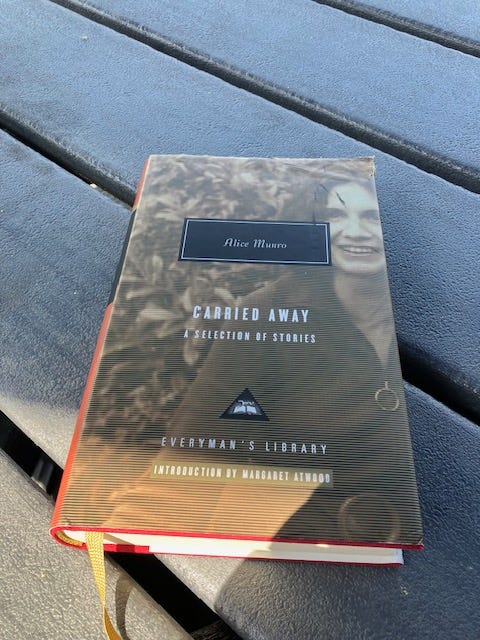
But another great thing about short stories is that many of them are free online. If you’re looking for a classic, like The Lottery, you can find it with a quick Google. But so many publications are constantly publishing new fiction, so it’s easy to just read a story on The New Yorker instead of scrolling through Instagram (she says as an admonishment to herself).
Here’s my list, including the stories I read back in February. You’ll see that I don’t actually read a story every single day—just most days. I include the name, author name, date published, and date read on my list. I think it’s interesting to see how much variation I get in years published. In my novel-reading life, I don’t read enough books published before, like, 2010, so I love that short fiction gives me a chance to diversify my reading a bit.
Quite a few of these are rereads. I was in college in the early 2000s, so of course we were reading and admiring ZZ Packer, but reading Brownies as an adult was a wonderful experience. I’ve found that the stories in the 100 Years collection are almost invariably my favorites. Lawns by Mona Simpson made me gasp, as did Friend of My Youth by Alice Munro. I’m still thinking about both of them—I even told Hollis the entire plot of Lawns, right down to the lawn-mowing denouement1, because I couldn’t stop thinking about it. The Dungeon Master by Sam Lipsyte had a few scenes that are stuck in my mind. And in case you assumed The Lottery was a reread…well guess what, it wasn’t. I already knew what happened because I’m a part of American society but I’d never actually read it, so that was a treat. I’ve had so many shocking moments, so many gasping surprises, so many tears and underlines. I know I always say I’m having the time of my life, but I really am!
Me, talking about short stories as a form:
The best thing about Short Story Summer is that it’s here for us all! Everyone is welcome. It doesn’t have to cost money—you can look stories up online or check out collections from your library, in physical form or via Libby.
I realize I may be the only person on a Short Story Summer journey, but that’s okay. Let me know if you decide to join in…all are welcome and the water’s fine (okay, the water’s weird and surprising and treacherous, depending on what kind of story you’re reading…honestly, the water’s probably a metaphor for some kind of hidden family secret2). And please do let me know your favorite short story collections, the stories you haven’t been able to get out of your mind since college, etc. Oh, and read Charles Baxter please! All I ever want to do is spread the good word of Charles Baxter. Pick up a copy of Gryphon and get ready to have your life changed.
That’s it for now. See you again very soon because my family is once again healthy (rejoice!) and life is good. xo
A little warning that this story is very upsetting. Trigger warnings abound, so if you’re a sensitive reader, take heed.
Every time I use parentheses (so, one million times per newsletter) I think about the guy in my college workshop who hated my parentheses and told me, “You’re too good for parentheses.” He wasn’t trying to be mean and he wasn’t even wrong that I overuse them, but he was wrong that I’m too good for them. Because clearly, I haven’t gotten off that train. Unfortunately I think I’m going to overuse parentheses forever.
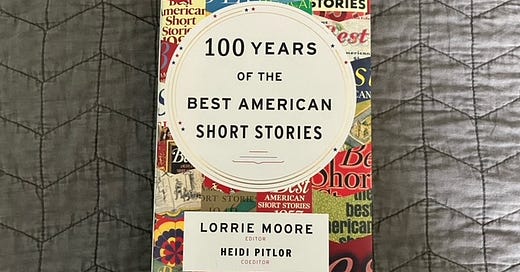



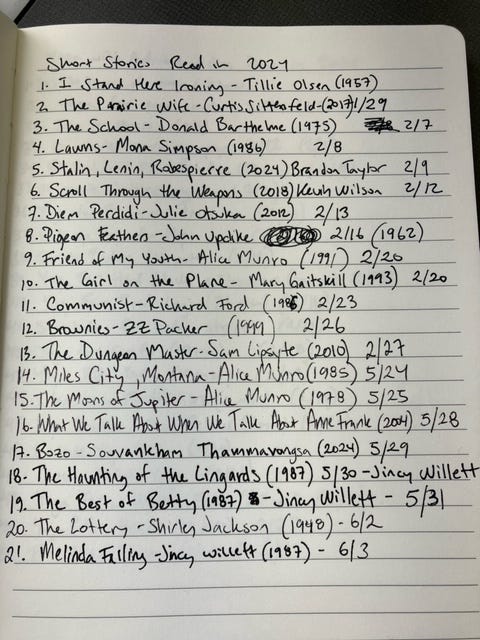
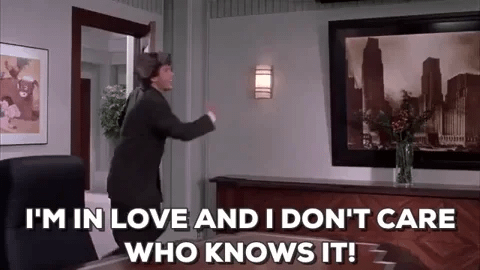
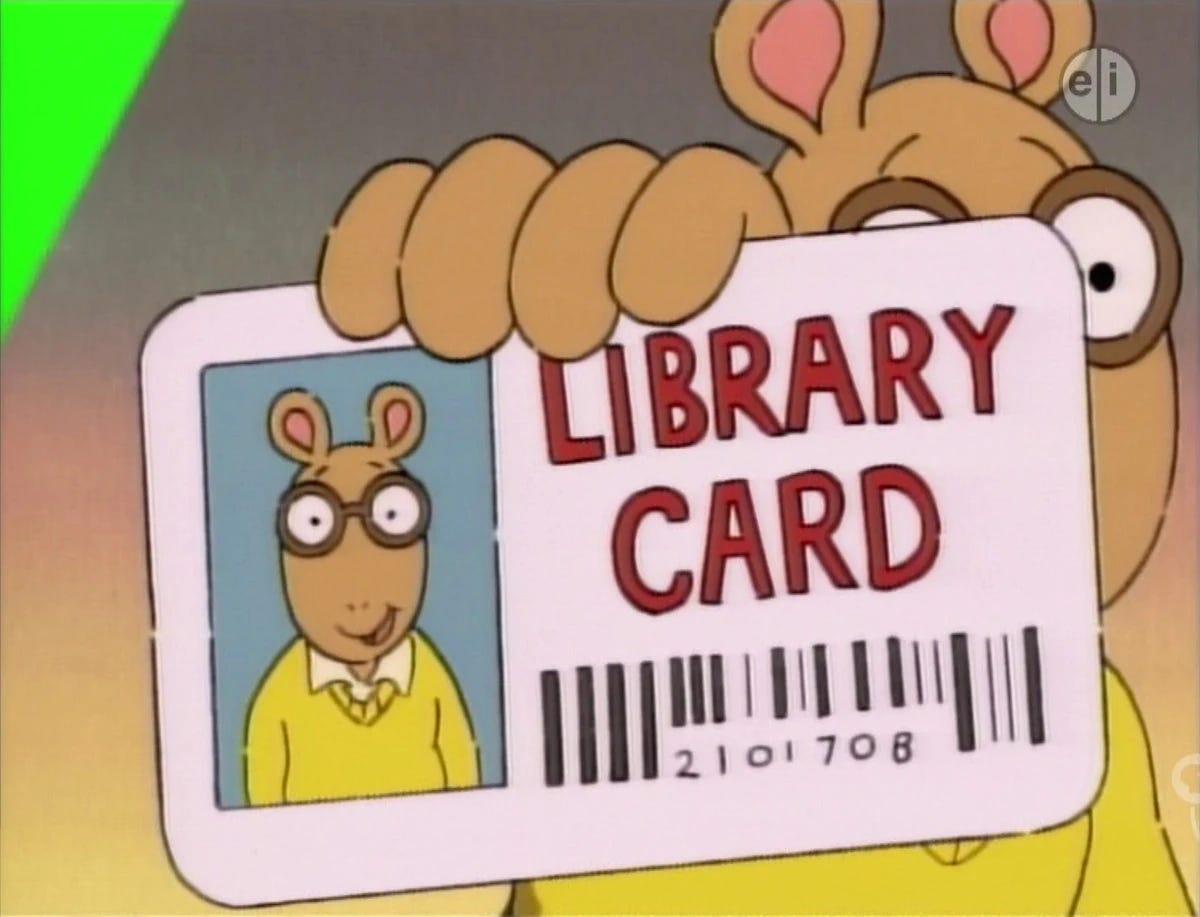
Speaking of short stories and parenthesis: I'm currently reading the Murderbot series (they're novellas, so a bit longer than short stories, but still short enough I can read in 1-2 days), and the parenthesis usage is HEAVY and it's my happy place. I LOVE parenthesis and exclamation points and emojis and any sort of novelty, "bad writing" things! I'm not a writer, I'm a reader, so! There you have it. Readers who are not jerks don't care! Martha Wells is KILLING it (no pun intended) with her murderbot parenthesis! Anyway. I love short stories and would be game for this except I did the thing other people do and committed to this 1200 page book which is the whole life story of an enslaved woman in northeast Brazil during the 19th century that is an absolute brilliant brilliant brilliant book (not translated to english yet, unfortunately, but if you by some reason want a Brazilian author short story recommendation to your list —im aware you didnt ask1 lol — Machado de Assis is great and has several translated) so I'm focusing on reading one chapter a day of that one. But if short stories summer makes a comeback in 2025 for a sequel... why not? I love a challenge.
This inspired me to read one of my favorites, "Yours" by Mary Robison! It's only 2 or so pages long, but I think about it all the time, probably more than a lot of novels I've read. (The second-to-last paragraph, my god.)